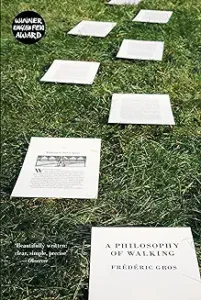A Philosophy of Walking by Frederic Gros 2011
What an interesting book this was, quite unlike most books about walking and a fine addition to that shelf. It combined the usual inquiry and analysis of what makes walking such a wonderful human experience—the solitude, slowness, silences, energy, well-being, repetition, and elemental gravity of the act—with examples of famous writers, philosophers, and critics who placed walking at the center of their lives and their work.
In prose that was occasionally stiff and convoluted (perhaps the result of its translation from French to English), Gros, a French philosopher, gives fascinating and unusual insights into Nietzsche (a daily walker to heights who wrote in his mind while he walked), Rimbaud (walking as flight as this poet walked all over Europe fleeing his small village French upbringing), Rousseau (walking to escape civilized man and return to Nature), Thoreau (well you know all about him and his daily 3-4 hour walks!), Nerval (walking as melancholia), Kant (a one hour walk at 5PM every day as part of an unchanging daily routine), Walter Benjamin (the flaneur walking in the capitalist, competitive city), Wordsworth (walking to write poetry), and Gandhi (walking as a political statement).
In each of these examples, Gros finds the elements that he glorifies in the act of putting one foot in front of the other—monotony but not boredom, discipline for completing the inescapable fact that you must eventually reach your destination, simplicity, and a complete break from the usual pressures and tensions of life.
One element that I particularly enjoyed was the chapter on Walter Benjamin in which Gros distinguished between the urban and the rural walk. The latter is all about silence, nature, solitude, and the Essence, as described by Wordsworth and Rousseau. The former is all about anonymity among crowds, slowing down to observe the other among speeding people and vehicles, and resisting the consumerism of the capitalist world. Gros’s comment about finding stories in the faces of those who the walker passes in the city is my experience of walking in Cambridge as is the quiet solitude of walking in the Vermont woods and dirt roads.
This book will not engage everyone, but if you are a walker, you will find much to ponder and enjoy as Gros introduces you to other walkers and thinkers.



